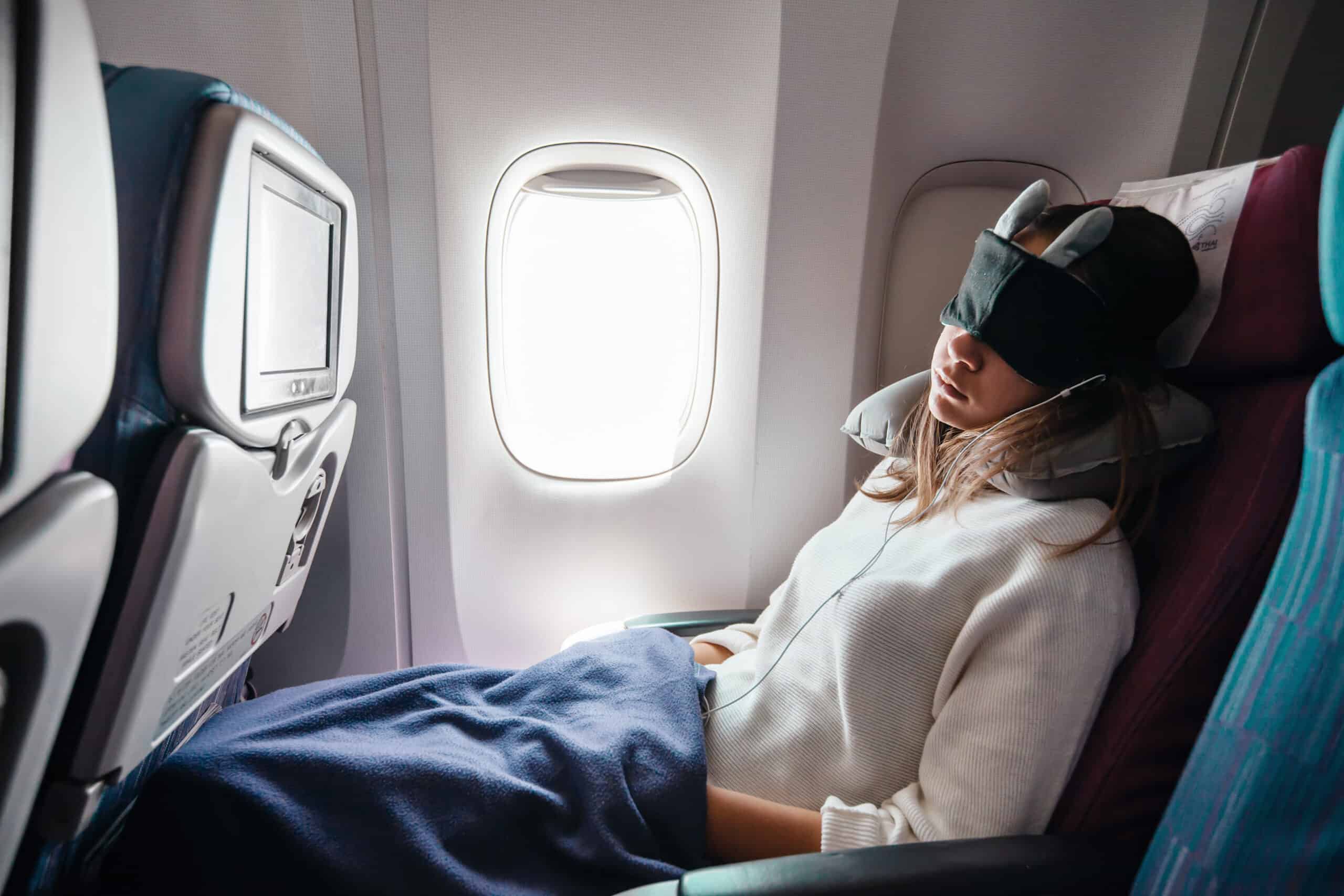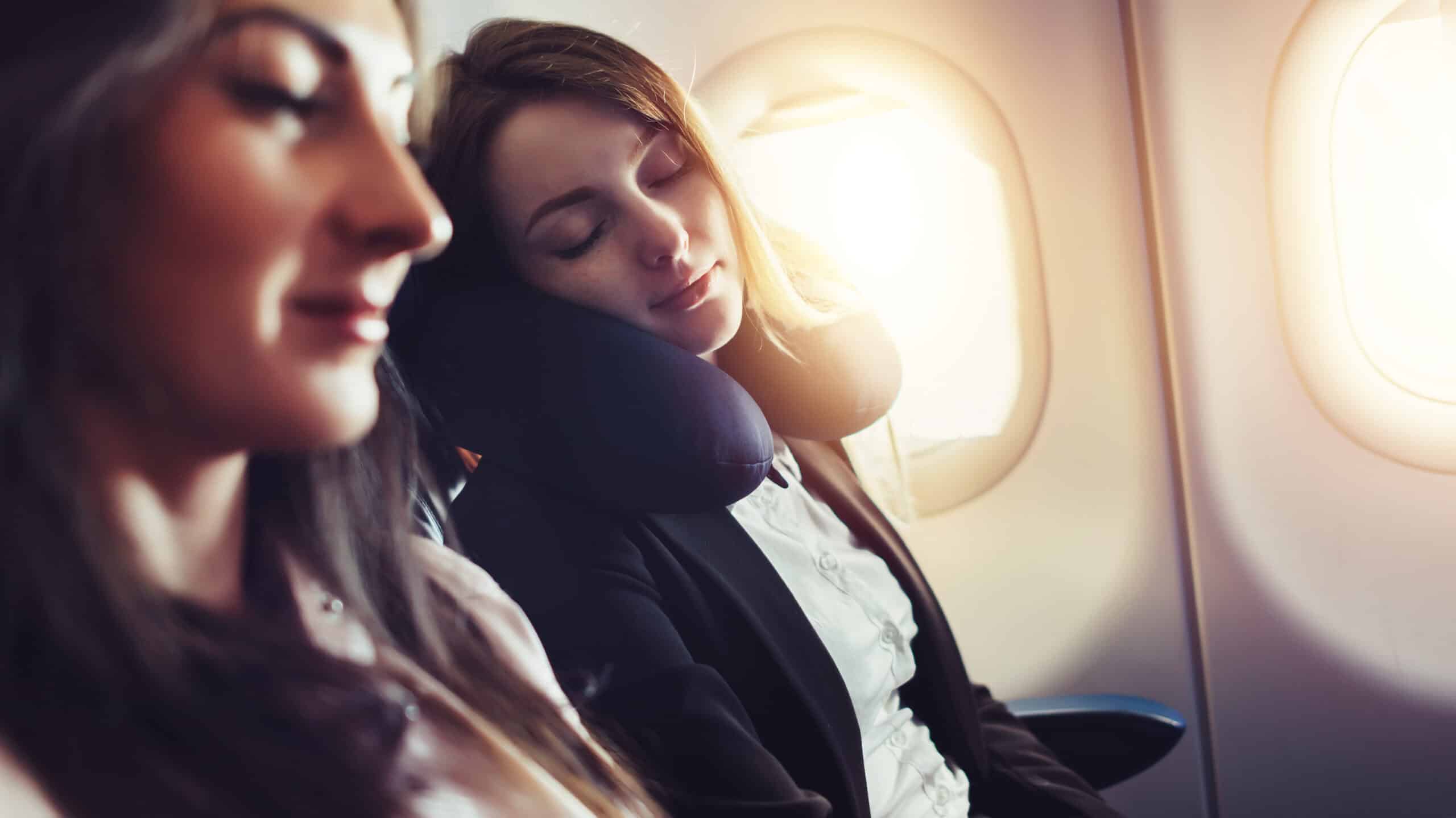Many people would jump at the opportunity to travel if it meant taking a break from the monotony of daily life.
Visiting incredible sights and enjoying new foods is a fantasy for those with wanderlust in their veins.
However, as impressive as it may sound, your venture won't be entirely perfect from start to finish, just like in the movies, especially if you're traveling by plane.

Whether it's a flight delay or misplaced luggage, there can be one problem after another when flying.
One aspect that doesn't seem to be touched on a lot is sleeping mid-flight—or a lack thereof.
There are many reasons why that is: a fear of heights, anxiety, stress, or perhaps all of the above.
When you're supposed to be relaxing, having trouble sleeping can put a damper on that plan.
How to Fall Asleep During a Flight
So, you can't fall asleep. Maybe this is your first time flying, and you have the typical first-time jitters—or it might be that the other passengers are too noisy for you to get any shut-eye.
Whatever the case, here's what you can do to try falling asleep.
1. Invest in Sleeping Aids
First, let's discuss what exactly is a sleeping aid. Because your mind might've already jumped to the idea that it's medication, but that's not what this article is about.
A sleeping aid is anything that helps you fall and stay asleep.
Travel Pillows
Travel pillows are a popular sleep aid. Using a top-quality travel pillow can be of great help, especially during long flights.
Travel pillows should be soft and bendable enough to support your neck. Make sure that you can bring it anywhere and anytime with you.
Chose to have a light and easy-to-carry travel pillow to avoid the hustle and bustle of having bulky stuff when traveling.
Watch the video below to learn more about travel pillows.
Sleep Masks
Darkness is conducive to falling and staying asleep. If you're used to wearing a sleep mask at home, bring it with you for overnight flights.
Some airlines provide sleep masks, but chances are whatever you buy will be of a higher quality.
Noise-Canceling Headphones
Along with travel pillows and sleep masks, noise-canceling headphones can help you sleep during your trip.
These will soften, if not entirely, block-out noises like a crying baby or chit-chat from other passengers.
Buy headphones with soft cushions that cover your entire ear.
They'll do a better job blocking noise, plus they're more comfortable when worn for many hours at a time.
2. Take a Supplement
Sleep-related supplements can make a world of difference.
Our brains naturally produce melatonin, a hormone that regulates sleep cycles. However, long-distance travel can disrupt your body's natural patterns.
Taking a low-dose melatonin supplement can help induce sleep. Melatonin is typically available at pharmacies and wherever supplements are sold.
However, if that doesn't work or you experience side effects, you can also try magnesium glycinate for sleep.
Like melatonin, magnesium is one of the many vitamins and minerals the human body needs to live a long, healthy life.
But unlike melatonin, this mineral concentrates more on controlling your stress levels, making it easier to fall asleep when you want.
Be sure to read the instructions for any supplement and take them at the correct dosage, or else you might experience unwanted side effects, such as:
- Headaches
- Nausea
- Fatigue
- Vivid dreams
3. Entertain Yourself
If you're not comfortable taking supplements—especially after learning the possible outcomes of taking the wrong dosage by accident—it's probably better to rely on entertainment.
Some flights might come with a crossword puzzle, or two tucked away in your seat, but if you want something else, bring a book of puzzles to pass the time.
Now, if puzzles aren't your style, try watching some informative documentaries instead.
Whether it's about history or nature, the soothing voice from the narrator might put you to sleep. Of course, this only applies to those who aren't big fans of documentaries.
If you think watching something on a screen might wake you up, try listening to podcasts.
There are many genres to choose from. From the serene noises of nature to the soothing retelling of a story—you're bound to find one to lull you to sleep.
Just try out anything that seems boring and mindless.
4. Avoid Stimulants
Since you're looking to relax long enough to fall asleep, frequent visits to the restroom might make that hard.
Don't drink caffeine before or during your flight.
Coffee will mess with your body by either forcing you to power through fatigue or by dehydrating you so much that you need to drink more water than usual (leading to more trips to the bathroom).
The same goes for nicotine and alcohol. If you have a habit of smoking or drinking alcohol, avoid doing either before boarding.

How to Get Quality Sleep
Let's say you've managed to fall asleep after trying out the tips above. However, you still feel drowsy after waking up. How can that be?
Well, you might have overlooked the importance of sleep quality over quantity.
Here are some additional tips to help you get the most from a quality nap during your flight.
1. Schedule Your Flight to Match Your Sleep
Of course, it makes sense for you to sleep at a time when you're supposed to be sleeping.
So, you can see why this is probably the best way for you to catch some sleep on a plane. However, this also demands more careful planning.
Book a flight that's scheduled around the time you're about to sleep.
Sure, you'll need to splurge a bit more here compared to the cheaper flights, but if you're willing to sacrifice a few bucks for a nice nap, then go ahead.
Unless you work a graveyard shift, choosing the morning flight might go against your circadian rhythm (or sleep cycle).
So instead of wasting time being restless in your seat, it's better if you go with a flight scheduled in the evening. It'll be easier for sleep to come your way.
2. Fly Business or First Class
It's normal to consider the costs of traveling—especially if you're on a budget—which is why you're booking a flight in economy class, right?
Although considerably cheaper, flying economy also means crowded seating arrangements on most airlines.
So ask yourself this first: can you handle being stuck with people on all sides until landing? If your answer's no, then consider an upgrade.
In a business or first-class seat, you're less likely to have a kid screeching in your ear.
Being in business or first class also affords you more privacy. Speaking of seats, you'll be enjoying a plush recliner that easily molds to your shape.
With peace and comfort provided the entire flight, it'll be easier to relax and fall asleep.
3. Wear Yourself Out
What better way to sleep than to exhaust yourself? Plan a full-body workout before you have to leave for the airport.
Not only can exercise help your chances at sleeping mid-flight but it can also:
- Relieve tension
- Alleviate stress
- Help you clear your mind
Of course, this won't guarantee you'll be falling asleep at the snap of your fingers, but it can help.
4. Wear Comfortable Clothes
Of course, sleep can't come fast enough when you're in a three-piece suit or wearing a pair of heels.
And being in a plane already spells out discomfort for everyone, especially if you're seated in economy class.
Since extra comforts aren't provided in this case, it's up to you to make yourself comfortable.
Fuzzy sweaters, soft t-shirts, snug pajama pants—try on whatever you'd wear when you go to sleep back home.
Sure, it might not make you look like a fashion icon, but as long as you feel cozy, anything else that bothers you in your flight will eventually be white noise. Now, you're on your way to a nice nap.
However, if you usually wear thin clothes as sleepwear, you might want to alter your wardrobe just for the flight.
Along with the air conditioning, being high up in the air promises a cool cabin, and being cold can make it hard to fall asleep.
Dress appropriately to keep warm—especially your feet! Having comfy socks on can do wonders.
5. Don’t Pack a Lot
Traveling to somewhere far never stops being nerve-wracking.
After all, what if you forgot something back home? What if you didn't pack enough clothes to last the whole trip?
These are some of the frequent worries you're bound to have as a first-time flyer and even as a frequent flier.
It can be tempting to pack many clothes; however, if you're flying carry-on only, then try to resist.
Take only what you need because there's limited space for your bag in the cabin.
If you've got an oversized personal item taking up valuable leg room under the seat in front of you, it'll be hard to stretch out and relax.
6. Be Screen-free
Ever wonder why you wake entirely as soon as sunlight hits your face? Well, that's because, besides noise, light also affects your circadian rhythm.
It's part of human nature to work during the day and sleep at night. Of course, some people are the complete opposite (they're called ‘night owls'), but they can't deny that they have a fixed sleep schedule, as well—only flipped over.
Either way, light plays a part in your sleep. And you already have a light source in easy reach.
Your phone, tablet, laptop—whatever gadget you got is best used as sparingly as possible if you want to rest.
Sure, few people can say using their phone helps them sleep. However, with the internet literally in the palm of your hand, sleeping will be the last thing on your mind.
Having a well of knowledge may be good for you at any other time—not so good for quality sleep, unfortunately.
Restrain yourself from checking your phone every few minutes. No, you don't need to be updated on what's happening on everyone's social media.
What you need is rest because that's all you're going to think of later once the plane lands, and you need to continue onward to your ultimate destination.
7. Be One Step Ahead
So, you have the noise aspect covered along with the light. Now, you're confident you can sleep peacefully until a flight attendant offers you a drink.
Since you can't blame them for doing their job, it's up to you to tell them you're going to sleep. Before you do that, though, you should:
- Buckle your seatbelt (over your blanket if you have one)
- Request for everything you might need beforehand
- Ask ahead of time for a few hours undisturbed
Once you get that done, it's a one-way ticket to dreamland for you!
Fly Into Dreamland
As exciting as it is to explore new places, there's always a lull in-between.
Since that lull tends to be the most tiresome aspect of traveling, what better way than to sleep it off rather than remain restless?
Not only will it pass the time, but sleeping can also bring back the energy you last from preparing for the flight.
This way, you'll be pumped up for the rest of the trip as soon as you land.
______
This story is brought to you in partnership with PineTales.
Ruby Rain is a fitness specialist. She shares her expertise by writing blog posts and guest posts online. Ruby spends her free time swimming, cycling, and hiking.
Planning a trip? Go Backpacking recommends:
- G Adventures for small group tours.
- Hostelworld for booking hostels.
